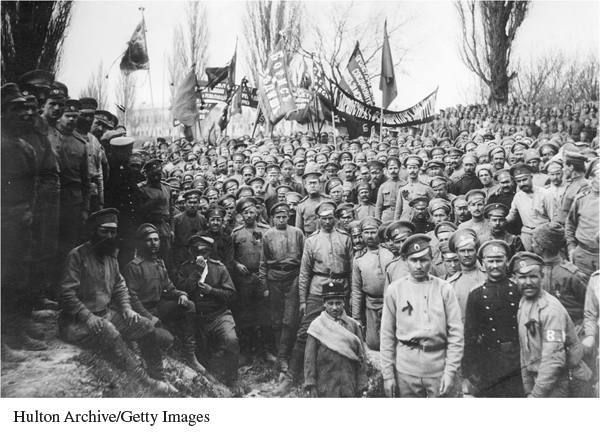A History of Western Society: Printed Page 847
A History of Western Society, Value Edition: Printed Page 815
A History of Western Society, Concise Edition: Printed Page 848
Lenin and the Bolshevik Revolution
Born into the middle class, Lenin became an enemy of imperial Russia when his older brother was executed for plotting to kill archconservative Tsar Alexander III in 1887. As a law student, Lenin eagerly studied Marxist socialism, which began to win converts among radical intellectuals during Russia’s industrialization in the 1890s. A pragmatic and flexible thinker, Lenin updated Marx’s revolutionary philosophy to address existing conditions in Russia.
Key Events of the Russian Revolution
| August 1914 | Russia enters World War I |
| 1916–1917 | Tsarist government in crisis |
| March 1917 | February Revolution; establishment of provisional government; tsar abdicates |
| April 1917 | Lenin returns from exile |
| July 1917 | Bolshevik attempt to seize power fails |
| October 1917 | Bolsheviks gain a majority in the Petrograd Soviet |
| November 6–7, 1917 | Bolsheviks seize power; Lenin named head of new Communist government |
| 1918–1920 | Civil war |
| March 1918 | Treaty of Brest- |
| 1920 | Civil war ends; Lenin and Bolshevik- |
Three interrelated concepts were central for Lenin. First, he stressed that only violent revolution could destroy capitalism. He tirelessly denounced all “revisionist” theories of a peaceful evolution to socialism (see Chapter 23) as a betrayal of Marx’s message of violent class conflict. Second, Lenin argued that under certain conditions a Communist revolution was possible even in a predominantly agrarian country like Russia. Peasants, who were numerous, poor, and exploited, could take the place of Marx’s traditional working class in the coming revolutionary conflict.

Third, Lenin believed that the possibility of revolution was determined more by human leadership than by historical laws. He called for a highly disciplined workers’ party strictly controlled by a small, dedicated elite of intellectuals and professional revolutionaries. This elite would not stop until revolution brought it to power. Lenin’s version of Marxism had a major impact on events in Russia and ultimately changed the way future revolutionaries engaged in radical revolt around the world.
Other Russian Marxists challenged Lenin’s ideas. At meetings of the Russian Social Democratic Labor Party in London in 1903, matters came to a head. Lenin demanded a small, disciplined, elitist party dedicated to Communist revolution, while his opponents wanted a more democratic, reformist party with mass membership (like the German SPD). The Russian Marxists split into two rival factions. Lenin called his camp the Bolsheviks, or “majority group”; his opponents were Mensheviks, or “minority group.” The Bolsheviks had only a tenuous majority of a single vote, but Lenin kept the name for propaganda reasons and they became the revolutionary party he wanted: tough, disciplined, and led from above.
Unlike other socialists, Lenin had not rallied around the national flag in 1914. Observing events from neutral Switzerland, where he lived in exile to avoid persecution by the tsar’s police, Lenin viewed the war as a product of imperialist rivalries and an opportunity for socialist revolution. After the February Revolution of 1917, the German government provided Lenin with safe passage across Germany and back into Russia. The Germans hoped Lenin would undermine the sagging war effort of the provisional government. They were not disappointed.
Arriving triumphantly at Petrograd’s Finland Station on April 3, Lenin attacked at once. He rejected all cooperation with what he called the “bourgeois” provisional government. His slogans were radical in the extreme: “All power to the soviets”; “All land to the peasants”; “Stop the war now.” Lenin was a superb tactician. His promises of “Peace, Land, and Bread” spoke to the expectations of suffering soldiers, peasants, and workers and earned the Bolsheviks substantial popular support. The moment for revolution was at hand.
Yet Lenin and the Bolsheviks almost lost the struggle for Russia. A premature attempt to seize power in July collapsed, and Lenin went into hiding. However, this temporary setback made little difference in the long run. The army’s commander in chief, General Lavr Kornilov, led a feeble coup against the provisional Kerensky government in September. In the face of this rightist counter-